Air Cargo Development: UK, Hong Kong Comparison, Challenges
VerifiedAdded on 2023/01/17
|11
|3055
|63
Report
AI Summary
This report provides a detailed analysis of the air cargo industry, focusing on its development in the United Kingdom and comparing it with the air cargo hub of Hong Kong. It begins with an introduction to the increasing demand for air cargo driven by globalization and industrialization, highlighting the role of air transport in handling time-sensitive and temperature-controlled goods. The report then delves into the development of air cargo in the UK, specifically mentioning Cargo Logic Air, the leading cargo airline, and its operations. It explores the factors influencing air cargo development, including environmental issues, economic conditions, operating costs, and the handling of perishable goods, weight, and size considerations, and premium services. The report then compares the UK and Hong Kong, examining the advantages of Hong Kong, such as its strategic location, world-class infrastructure, industrialization, and pricing, while also acknowledging the technological advancements in both regions and their 24-hour operations. Finally, it addresses the challenges facing the air cargo industry, including the impact of e-commerce, security filings, and changes in mail shipments, offering a comprehensive overview of the industry's current state and future prospects.
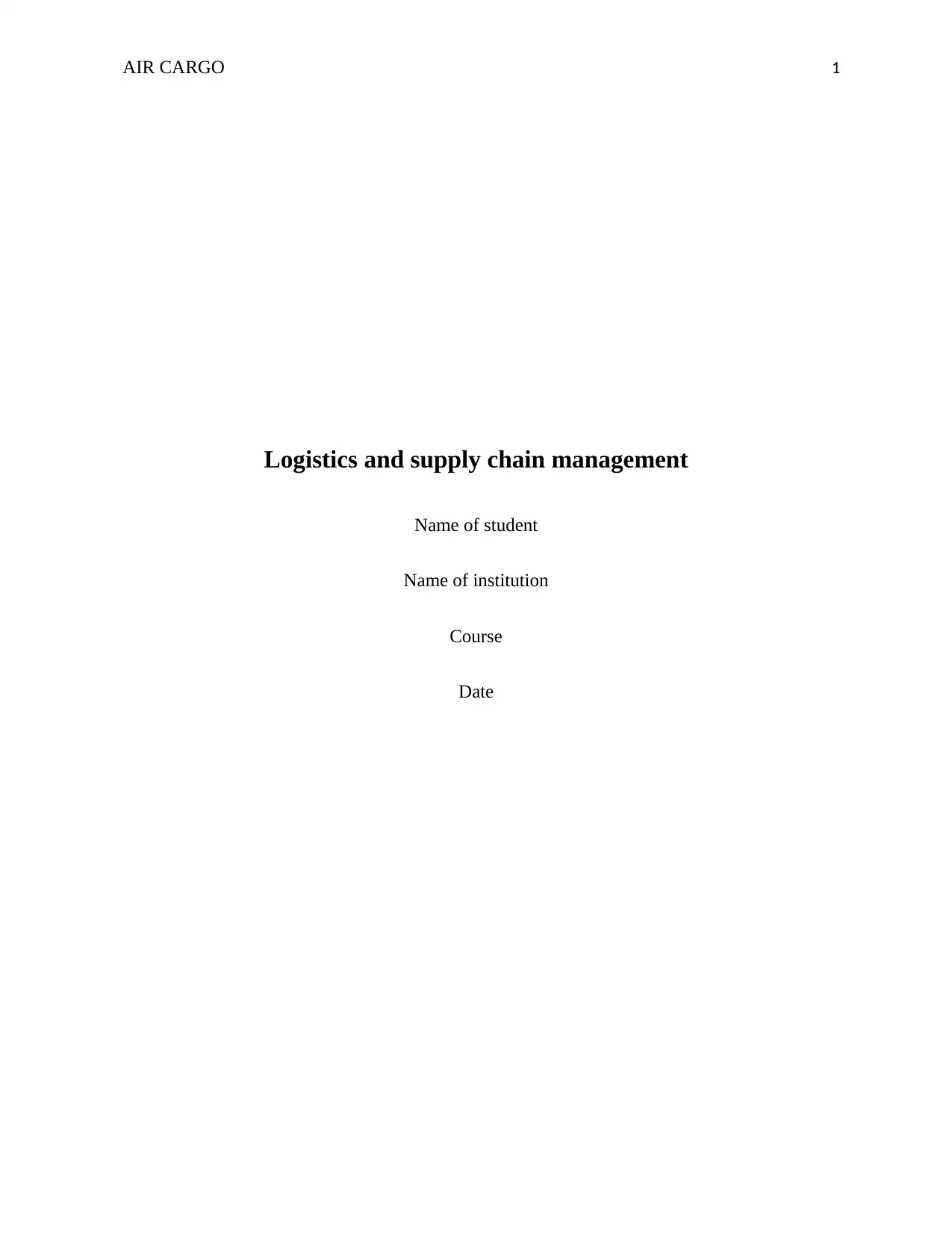
AIR CARGO 1
Logistics and supply chain management
Name of student
Name of institution
Course
Date
Logistics and supply chain management
Name of student
Name of institution
Course
Date
Paraphrase This Document
Need a fresh take? Get an instant paraphrase of this document with our AI Paraphraser
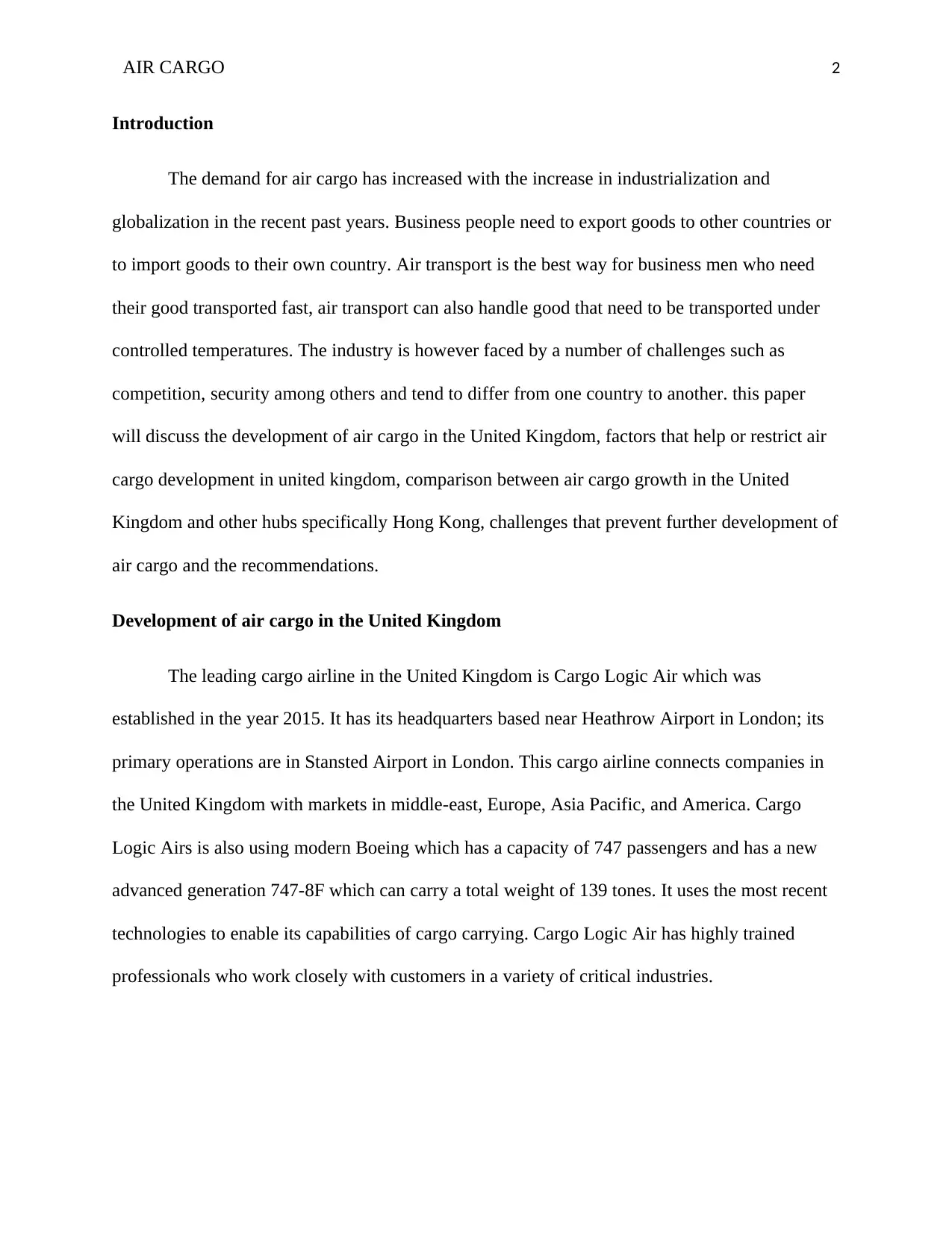
AIR CARGO 2
Introduction
The demand for air cargo has increased with the increase in industrialization and
globalization in the recent past years. Business people need to export goods to other countries or
to import goods to their own country. Air transport is the best way for business men who need
their good transported fast, air transport can also handle good that need to be transported under
controlled temperatures. The industry is however faced by a number of challenges such as
competition, security among others and tend to differ from one country to another. this paper
will discuss the development of air cargo in the United Kingdom, factors that help or restrict air
cargo development in united kingdom, comparison between air cargo growth in the United
Kingdom and other hubs specifically Hong Kong, challenges that prevent further development of
air cargo and the recommendations.
Development of air cargo in the United Kingdom
The leading cargo airline in the United Kingdom is Cargo Logic Air which was
established in the year 2015. It has its headquarters based near Heathrow Airport in London; its
primary operations are in Stansted Airport in London. This cargo airline connects companies in
the United Kingdom with markets in middle-east, Europe, Asia Pacific, and America. Cargo
Logic Airs is also using modern Boeing which has a capacity of 747 passengers and has a new
advanced generation 747-8F which can carry a total weight of 139 tones. It uses the most recent
technologies to enable its capabilities of cargo carrying. Cargo Logic Air has highly trained
professionals who work closely with customers in a variety of critical industries.
Introduction
The demand for air cargo has increased with the increase in industrialization and
globalization in the recent past years. Business people need to export goods to other countries or
to import goods to their own country. Air transport is the best way for business men who need
their good transported fast, air transport can also handle good that need to be transported under
controlled temperatures. The industry is however faced by a number of challenges such as
competition, security among others and tend to differ from one country to another. this paper
will discuss the development of air cargo in the United Kingdom, factors that help or restrict air
cargo development in united kingdom, comparison between air cargo growth in the United
Kingdom and other hubs specifically Hong Kong, challenges that prevent further development of
air cargo and the recommendations.
Development of air cargo in the United Kingdom
The leading cargo airline in the United Kingdom is Cargo Logic Air which was
established in the year 2015. It has its headquarters based near Heathrow Airport in London; its
primary operations are in Stansted Airport in London. This cargo airline connects companies in
the United Kingdom with markets in middle-east, Europe, Asia Pacific, and America. Cargo
Logic Airs is also using modern Boeing which has a capacity of 747 passengers and has a new
advanced generation 747-8F which can carry a total weight of 139 tones. It uses the most recent
technologies to enable its capabilities of cargo carrying. Cargo Logic Air has highly trained
professionals who work closely with customers in a variety of critical industries.
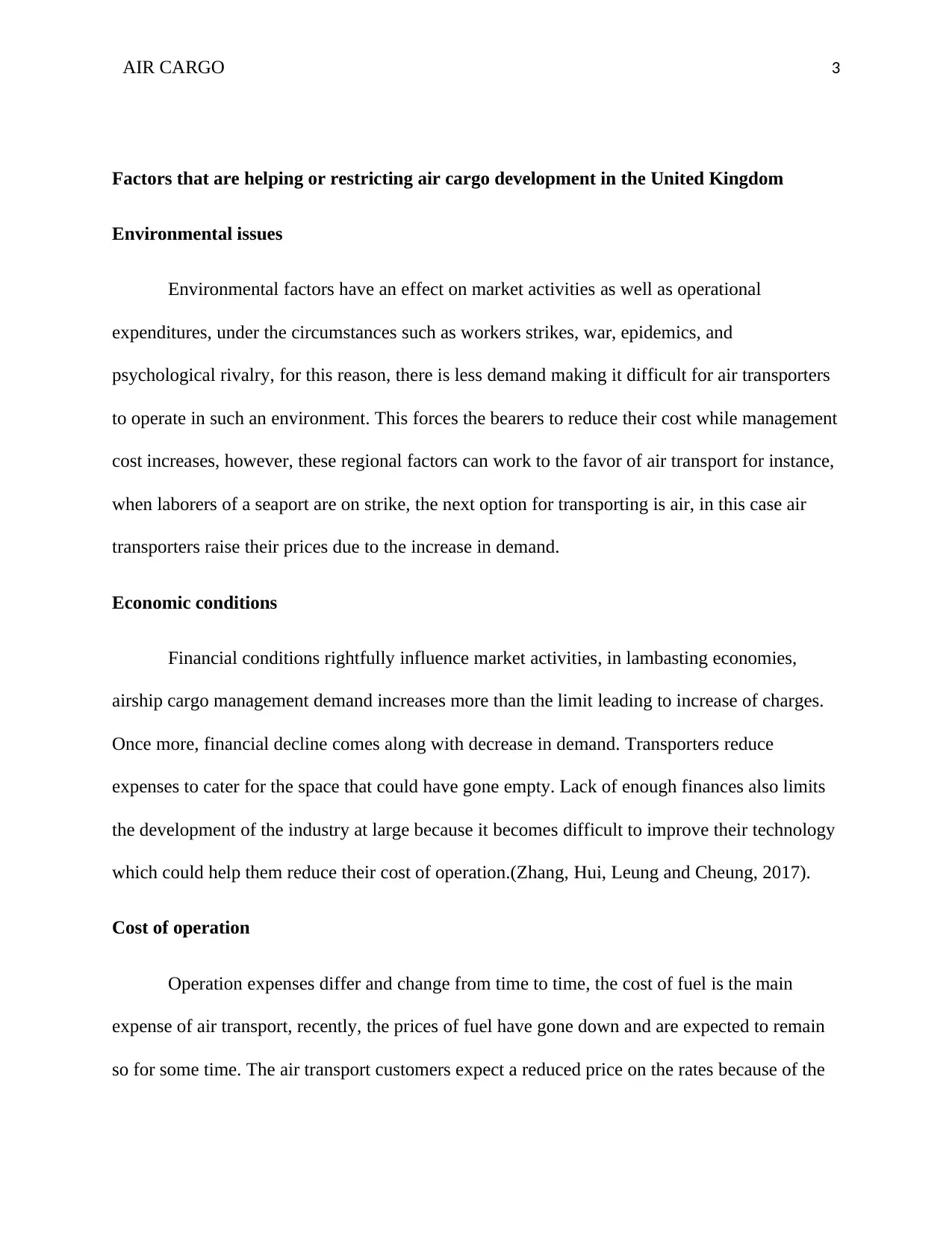
AIR CARGO 3
Factors that are helping or restricting air cargo development in the United Kingdom
Environmental issues
Environmental factors have an effect on market activities as well as operational
expenditures, under the circumstances such as workers strikes, war, epidemics, and
psychological rivalry, for this reason, there is less demand making it difficult for air transporters
to operate in such an environment. This forces the bearers to reduce their cost while management
cost increases, however, these regional factors can work to the favor of air transport for instance,
when laborers of a seaport are on strike, the next option for transporting is air, in this case air
transporters raise their prices due to the increase in demand.
Economic conditions
Financial conditions rightfully influence market activities, in lambasting economies,
airship cargo management demand increases more than the limit leading to increase of charges.
Once more, financial decline comes along with decrease in demand. Transporters reduce
expenses to cater for the space that could have gone empty. Lack of enough finances also limits
the development of the industry at large because it becomes difficult to improve their technology
which could help them reduce their cost of operation.(Zhang, Hui, Leung and Cheung, 2017).
Cost of operation
Operation expenses differ and change from time to time, the cost of fuel is the main
expense of air transport, recently, the prices of fuel have gone down and are expected to remain
so for some time. The air transport customers expect a reduced price on the rates because of the
Factors that are helping or restricting air cargo development in the United Kingdom
Environmental issues
Environmental factors have an effect on market activities as well as operational
expenditures, under the circumstances such as workers strikes, war, epidemics, and
psychological rivalry, for this reason, there is less demand making it difficult for air transporters
to operate in such an environment. This forces the bearers to reduce their cost while management
cost increases, however, these regional factors can work to the favor of air transport for instance,
when laborers of a seaport are on strike, the next option for transporting is air, in this case air
transporters raise their prices due to the increase in demand.
Economic conditions
Financial conditions rightfully influence market activities, in lambasting economies,
airship cargo management demand increases more than the limit leading to increase of charges.
Once more, financial decline comes along with decrease in demand. Transporters reduce
expenses to cater for the space that could have gone empty. Lack of enough finances also limits
the development of the industry at large because it becomes difficult to improve their technology
which could help them reduce their cost of operation.(Zhang, Hui, Leung and Cheung, 2017).
Cost of operation
Operation expenses differ and change from time to time, the cost of fuel is the main
expense of air transport, recently, the prices of fuel have gone down and are expected to remain
so for some time. The air transport customers expect a reduced price on the rates because of the
⊘ This is a preview!⊘
Do you want full access?
Subscribe today to unlock all pages.

Trusted by 1+ million students worldwide
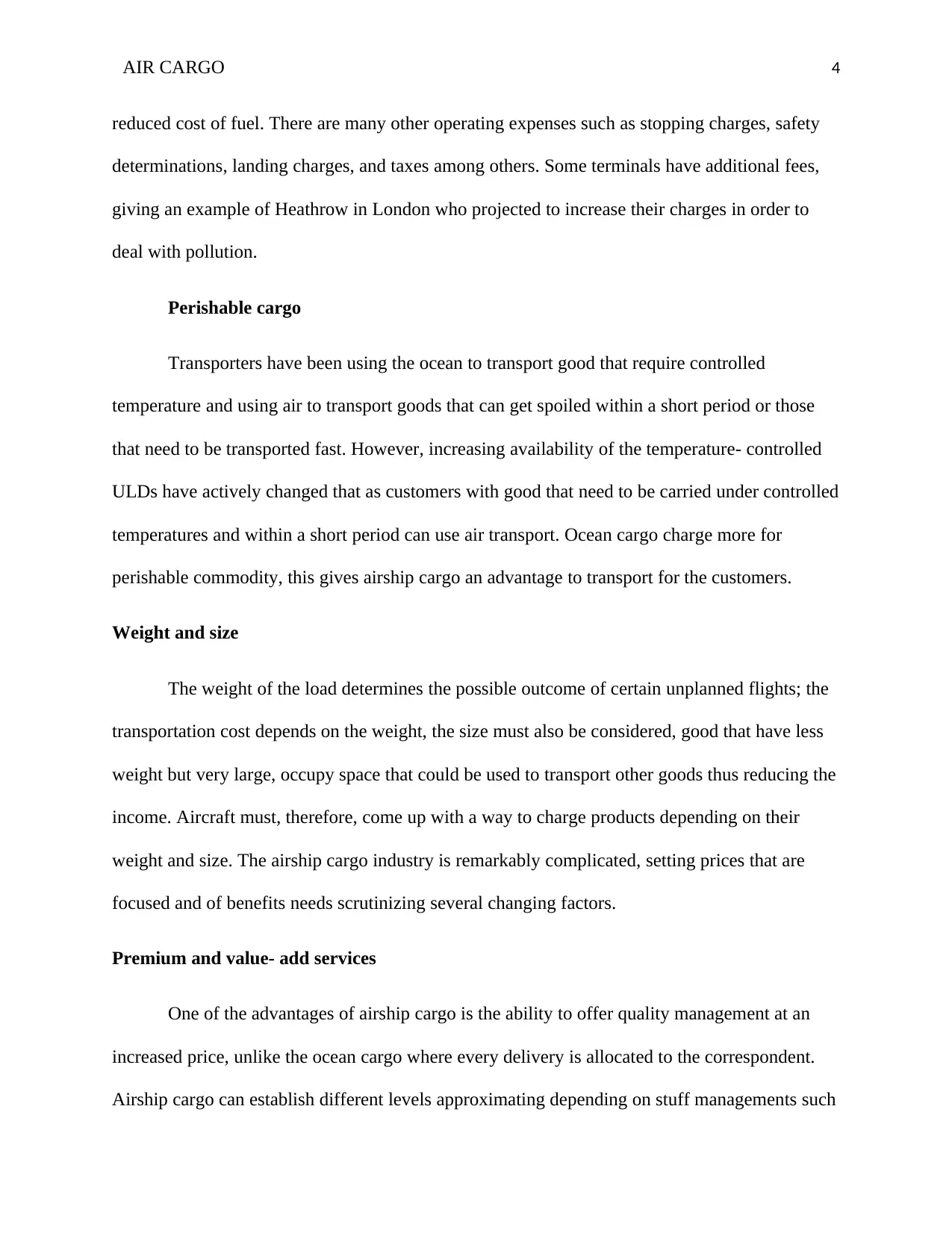
AIR CARGO 4
reduced cost of fuel. There are many other operating expenses such as stopping charges, safety
determinations, landing charges, and taxes among others. Some terminals have additional fees,
giving an example of Heathrow in London who projected to increase their charges in order to
deal with pollution.
Perishable cargo
Transporters have been using the ocean to transport good that require controlled
temperature and using air to transport goods that can get spoiled within a short period or those
that need to be transported fast. However, increasing availability of the temperature- controlled
ULDs have actively changed that as customers with good that need to be carried under controlled
temperatures and within a short period can use air transport. Ocean cargo charge more for
perishable commodity, this gives airship cargo an advantage to transport for the customers.
Weight and size
The weight of the load determines the possible outcome of certain unplanned flights; the
transportation cost depends on the weight, the size must also be considered, good that have less
weight but very large, occupy space that could be used to transport other goods thus reducing the
income. Aircraft must, therefore, come up with a way to charge products depending on their
weight and size. The airship cargo industry is remarkably complicated, setting prices that are
focused and of benefits needs scrutinizing several changing factors.
Premium and value- add services
One of the advantages of airship cargo is the ability to offer quality management at an
increased price, unlike the ocean cargo where every delivery is allocated to the correspondent.
Airship cargo can establish different levels approximating depending on stuff managements such
reduced cost of fuel. There are many other operating expenses such as stopping charges, safety
determinations, landing charges, and taxes among others. Some terminals have additional fees,
giving an example of Heathrow in London who projected to increase their charges in order to
deal with pollution.
Perishable cargo
Transporters have been using the ocean to transport good that require controlled
temperature and using air to transport goods that can get spoiled within a short period or those
that need to be transported fast. However, increasing availability of the temperature- controlled
ULDs have actively changed that as customers with good that need to be carried under controlled
temperatures and within a short period can use air transport. Ocean cargo charge more for
perishable commodity, this gives airship cargo an advantage to transport for the customers.
Weight and size
The weight of the load determines the possible outcome of certain unplanned flights; the
transportation cost depends on the weight, the size must also be considered, good that have less
weight but very large, occupy space that could be used to transport other goods thus reducing the
income. Aircraft must, therefore, come up with a way to charge products depending on their
weight and size. The airship cargo industry is remarkably complicated, setting prices that are
focused and of benefits needs scrutinizing several changing factors.
Premium and value- add services
One of the advantages of airship cargo is the ability to offer quality management at an
increased price, unlike the ocean cargo where every delivery is allocated to the correspondent.
Airship cargo can establish different levels approximating depending on stuff managements such
Paraphrase This Document
Need a fresh take? Get an instant paraphrase of this document with our AI Paraphraser
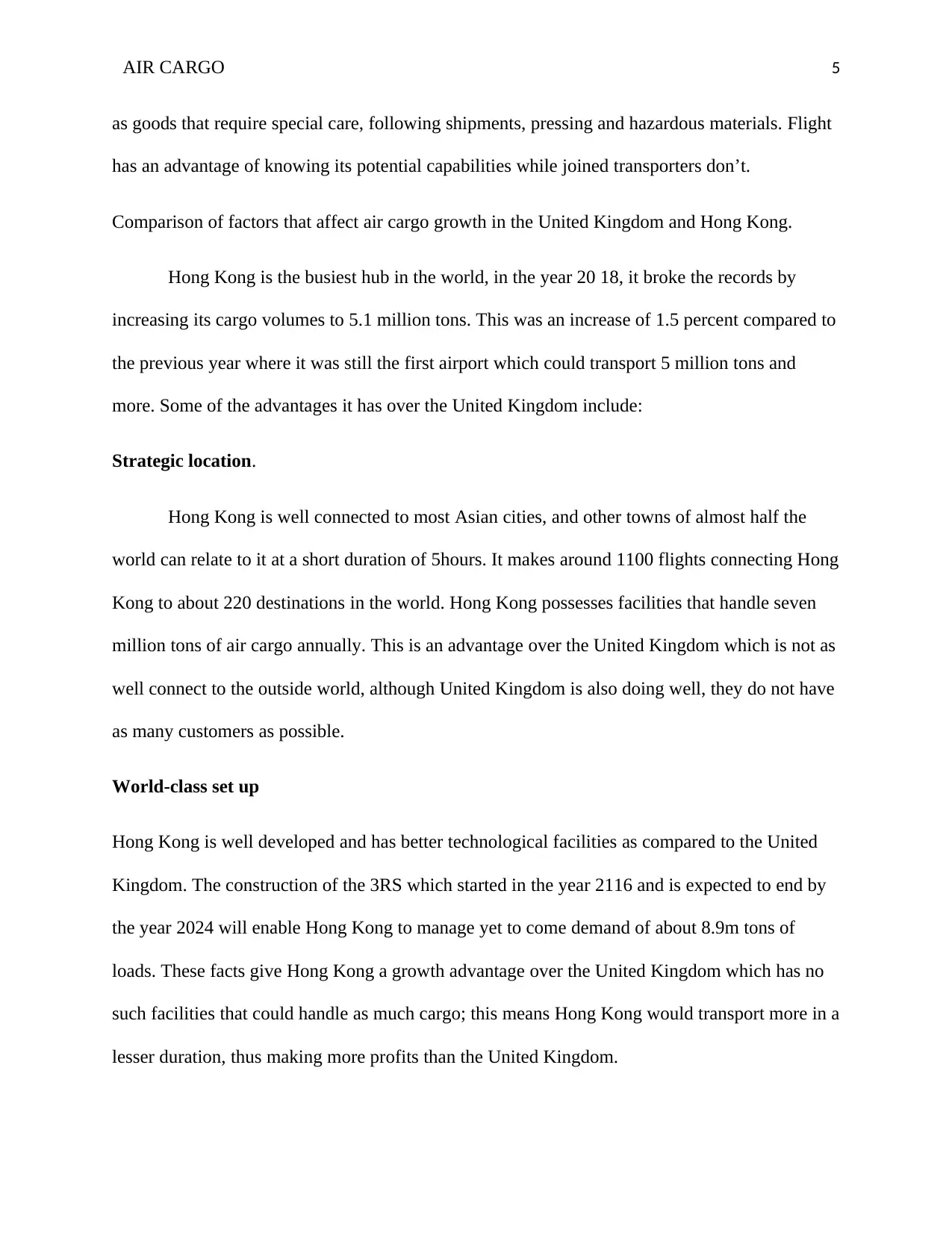
AIR CARGO 5
as goods that require special care, following shipments, pressing and hazardous materials. Flight
has an advantage of knowing its potential capabilities while joined transporters don’t.
Comparison of factors that affect air cargo growth in the United Kingdom and Hong Kong.
Hong Kong is the busiest hub in the world, in the year 20 18, it broke the records by
increasing its cargo volumes to 5.1 million tons. This was an increase of 1.5 percent compared to
the previous year where it was still the first airport which could transport 5 million tons and
more. Some of the advantages it has over the United Kingdom include:
Strategic location.
Hong Kong is well connected to most Asian cities, and other towns of almost half the
world can relate to it at a short duration of 5hours. It makes around 1100 flights connecting Hong
Kong to about 220 destinations in the world. Hong Kong possesses facilities that handle seven
million tons of air cargo annually. This is an advantage over the United Kingdom which is not as
well connect to the outside world, although United Kingdom is also doing well, they do not have
as many customers as possible.
World-class set up
Hong Kong is well developed and has better technological facilities as compared to the United
Kingdom. The construction of the 3RS which started in the year 2116 and is expected to end by
the year 2024 will enable Hong Kong to manage yet to come demand of about 8.9m tons of
loads. These facts give Hong Kong a growth advantage over the United Kingdom which has no
such facilities that could handle as much cargo; this means Hong Kong would transport more in a
lesser duration, thus making more profits than the United Kingdom.
as goods that require special care, following shipments, pressing and hazardous materials. Flight
has an advantage of knowing its potential capabilities while joined transporters don’t.
Comparison of factors that affect air cargo growth in the United Kingdom and Hong Kong.
Hong Kong is the busiest hub in the world, in the year 20 18, it broke the records by
increasing its cargo volumes to 5.1 million tons. This was an increase of 1.5 percent compared to
the previous year where it was still the first airport which could transport 5 million tons and
more. Some of the advantages it has over the United Kingdom include:
Strategic location.
Hong Kong is well connected to most Asian cities, and other towns of almost half the
world can relate to it at a short duration of 5hours. It makes around 1100 flights connecting Hong
Kong to about 220 destinations in the world. Hong Kong possesses facilities that handle seven
million tons of air cargo annually. This is an advantage over the United Kingdom which is not as
well connect to the outside world, although United Kingdom is also doing well, they do not have
as many customers as possible.
World-class set up
Hong Kong is well developed and has better technological facilities as compared to the United
Kingdom. The construction of the 3RS which started in the year 2116 and is expected to end by
the year 2024 will enable Hong Kong to manage yet to come demand of about 8.9m tons of
loads. These facts give Hong Kong a growth advantage over the United Kingdom which has no
such facilities that could handle as much cargo; this means Hong Kong would transport more in a
lesser duration, thus making more profits than the United Kingdom.
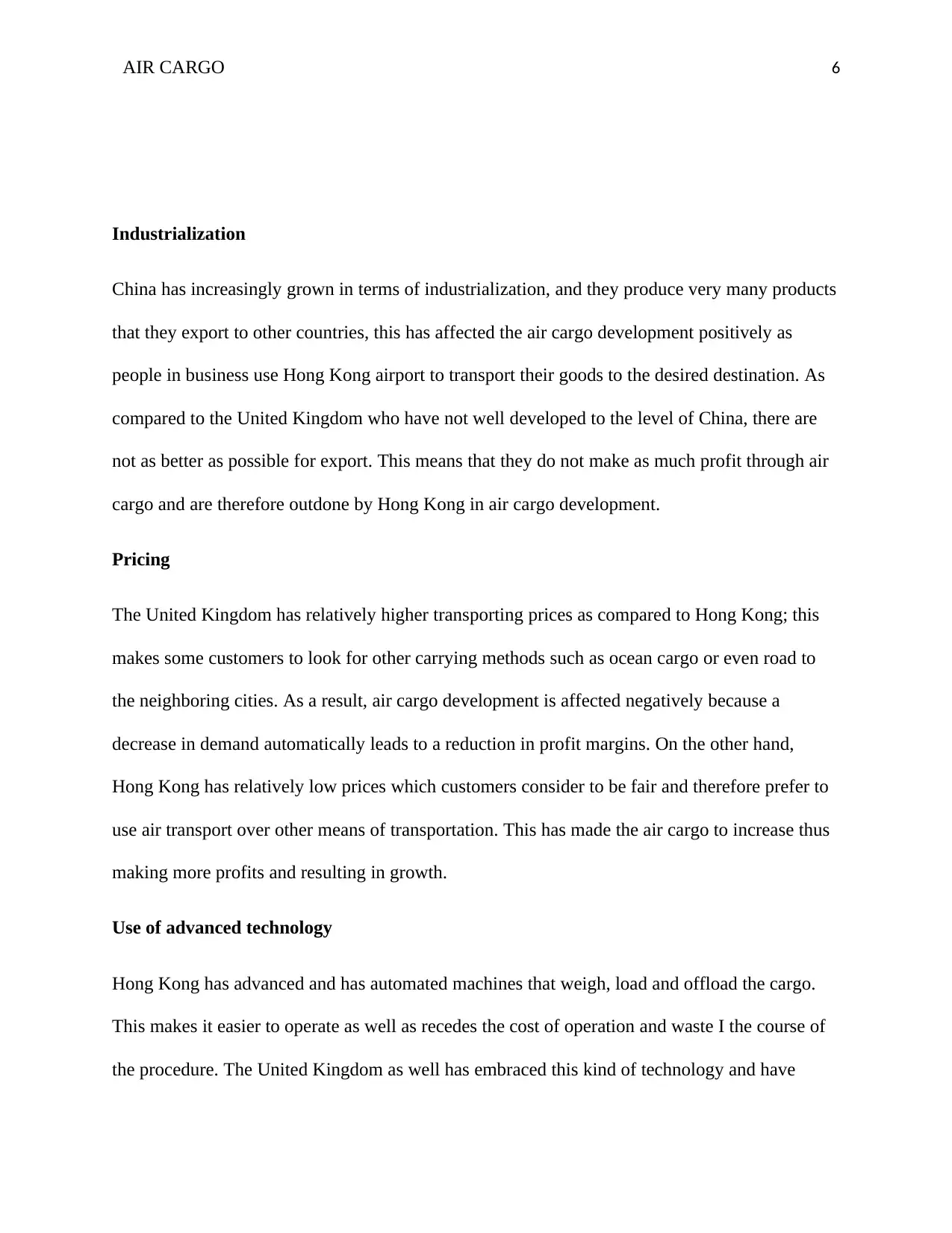
AIR CARGO 6
Industrialization
China has increasingly grown in terms of industrialization, and they produce very many products
that they export to other countries, this has affected the air cargo development positively as
people in business use Hong Kong airport to transport their goods to the desired destination. As
compared to the United Kingdom who have not well developed to the level of China, there are
not as better as possible for export. This means that they do not make as much profit through air
cargo and are therefore outdone by Hong Kong in air cargo development.
Pricing
The United Kingdom has relatively higher transporting prices as compared to Hong Kong; this
makes some customers to look for other carrying methods such as ocean cargo or even road to
the neighboring cities. As a result, air cargo development is affected negatively because a
decrease in demand automatically leads to a reduction in profit margins. On the other hand,
Hong Kong has relatively low prices which customers consider to be fair and therefore prefer to
use air transport over other means of transportation. This has made the air cargo to increase thus
making more profits and resulting in growth.
Use of advanced technology
Hong Kong has advanced and has automated machines that weigh, load and offload the cargo.
This makes it easier to operate as well as recedes the cost of operation and waste I the course of
the procedure. The United Kingdom as well has embraced this kind of technology and have
Industrialization
China has increasingly grown in terms of industrialization, and they produce very many products
that they export to other countries, this has affected the air cargo development positively as
people in business use Hong Kong airport to transport their goods to the desired destination. As
compared to the United Kingdom who have not well developed to the level of China, there are
not as better as possible for export. This means that they do not make as much profit through air
cargo and are therefore outdone by Hong Kong in air cargo development.
Pricing
The United Kingdom has relatively higher transporting prices as compared to Hong Kong; this
makes some customers to look for other carrying methods such as ocean cargo or even road to
the neighboring cities. As a result, air cargo development is affected negatively because a
decrease in demand automatically leads to a reduction in profit margins. On the other hand,
Hong Kong has relatively low prices which customers consider to be fair and therefore prefer to
use air transport over other means of transportation. This has made the air cargo to increase thus
making more profits and resulting in growth.
Use of advanced technology
Hong Kong has advanced and has automated machines that weigh, load and offload the cargo.
This makes it easier to operate as well as recedes the cost of operation and waste I the course of
the procedure. The United Kingdom as well has embraced this kind of technology and have
⊘ This is a preview!⊘
Do you want full access?
Subscribe today to unlock all pages.

Trusted by 1+ million students worldwide
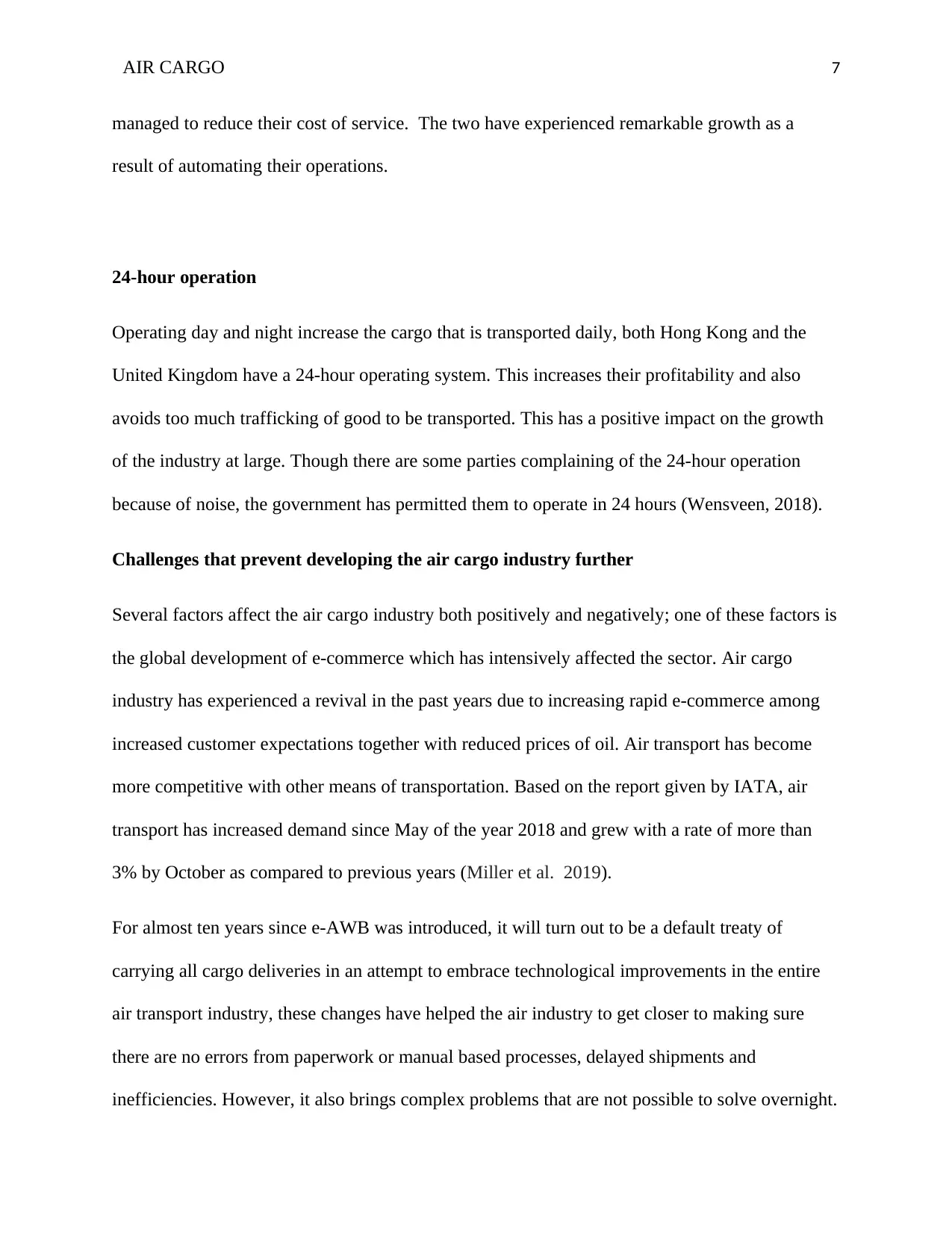
AIR CARGO 7
managed to reduce their cost of service. The two have experienced remarkable growth as a
result of automating their operations.
24-hour operation
Operating day and night increase the cargo that is transported daily, both Hong Kong and the
United Kingdom have a 24-hour operating system. This increases their profitability and also
avoids too much trafficking of good to be transported. This has a positive impact on the growth
of the industry at large. Though there are some parties complaining of the 24-hour operation
because of noise, the government has permitted them to operate in 24 hours (Wensveen, 2018).
Challenges that prevent developing the air cargo industry further
Several factors affect the air cargo industry both positively and negatively; one of these factors is
the global development of e-commerce which has intensively affected the sector. Air cargo
industry has experienced a revival in the past years due to increasing rapid e-commerce among
increased customer expectations together with reduced prices of oil. Air transport has become
more competitive with other means of transportation. Based on the report given by IATA, air
transport has increased demand since May of the year 2018 and grew with a rate of more than
3% by October as compared to previous years (Miller et al. 2019).
For almost ten years since e-AWB was introduced, it will turn out to be a default treaty of
carrying all cargo deliveries in an attempt to embrace technological improvements in the entire
air transport industry, these changes have helped the air industry to get closer to making sure
there are no errors from paperwork or manual based processes, delayed shipments and
inefficiencies. However, it also brings complex problems that are not possible to solve overnight.
managed to reduce their cost of service. The two have experienced remarkable growth as a
result of automating their operations.
24-hour operation
Operating day and night increase the cargo that is transported daily, both Hong Kong and the
United Kingdom have a 24-hour operating system. This increases their profitability and also
avoids too much trafficking of good to be transported. This has a positive impact on the growth
of the industry at large. Though there are some parties complaining of the 24-hour operation
because of noise, the government has permitted them to operate in 24 hours (Wensveen, 2018).
Challenges that prevent developing the air cargo industry further
Several factors affect the air cargo industry both positively and negatively; one of these factors is
the global development of e-commerce which has intensively affected the sector. Air cargo
industry has experienced a revival in the past years due to increasing rapid e-commerce among
increased customer expectations together with reduced prices of oil. Air transport has become
more competitive with other means of transportation. Based on the report given by IATA, air
transport has increased demand since May of the year 2018 and grew with a rate of more than
3% by October as compared to previous years (Miller et al. 2019).
For almost ten years since e-AWB was introduced, it will turn out to be a default treaty of
carrying all cargo deliveries in an attempt to embrace technological improvements in the entire
air transport industry, these changes have helped the air industry to get closer to making sure
there are no errors from paperwork or manual based processes, delayed shipments and
inefficiencies. However, it also brings complex problems that are not possible to solve overnight.
Paraphrase This Document
Need a fresh take? Get an instant paraphrase of this document with our AI Paraphraser
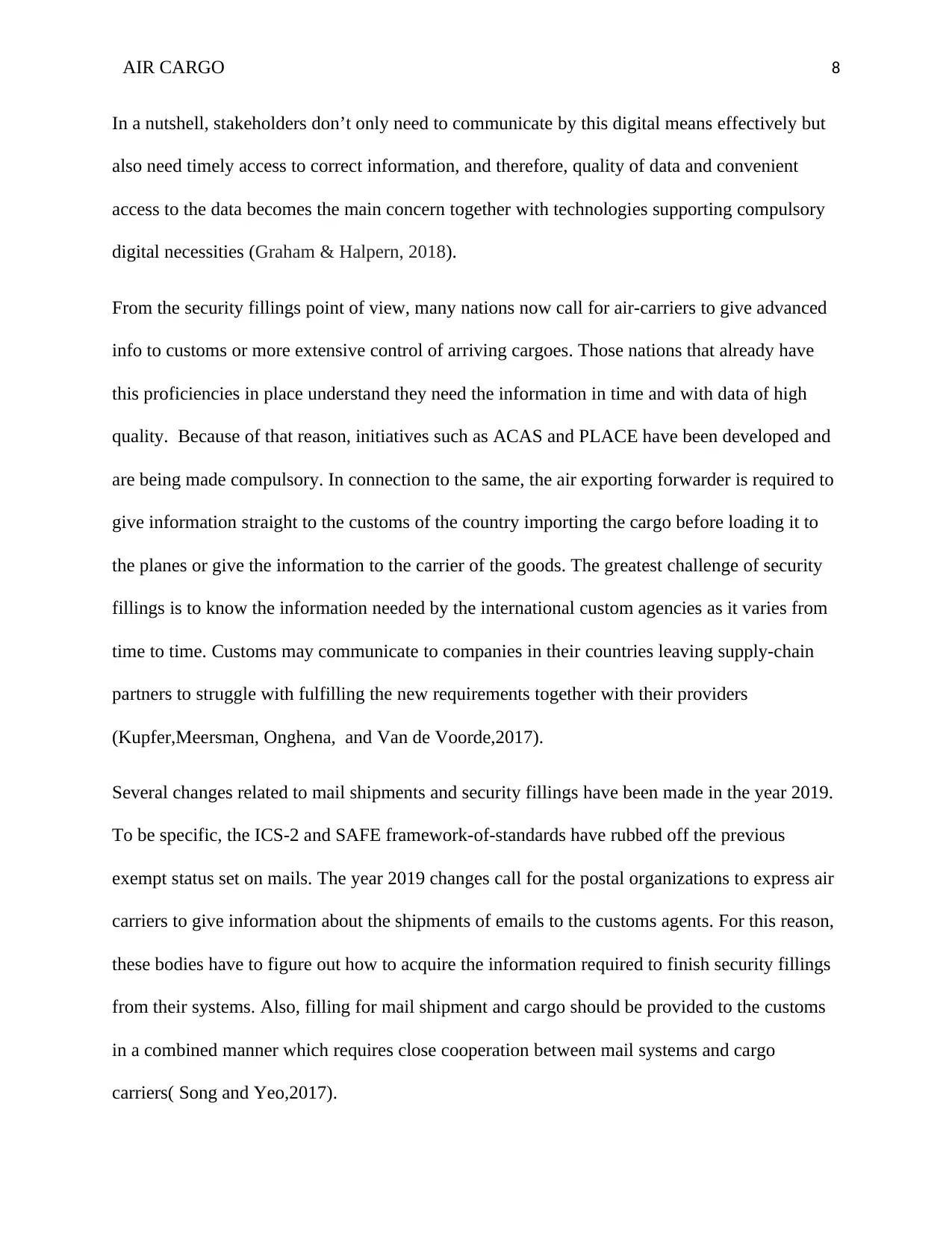
AIR CARGO 8
In a nutshell, stakeholders don’t only need to communicate by this digital means effectively but
also need timely access to correct information, and therefore, quality of data and convenient
access to the data becomes the main concern together with technologies supporting compulsory
digital necessities (Graham & Halpern, 2018).
From the security fillings point of view, many nations now call for air-carriers to give advanced
info to customs or more extensive control of arriving cargoes. Those nations that already have
this proficiencies in place understand they need the information in time and with data of high
quality. Because of that reason, initiatives such as ACAS and PLACE have been developed and
are being made compulsory. In connection to the same, the air exporting forwarder is required to
give information straight to the customs of the country importing the cargo before loading it to
the planes or give the information to the carrier of the goods. The greatest challenge of security
fillings is to know the information needed by the international custom agencies as it varies from
time to time. Customs may communicate to companies in their countries leaving supply-chain
partners to struggle with fulfilling the new requirements together with their providers
(Kupfer,Meersman, Onghena, and Van de Voorde,2017).
Several changes related to mail shipments and security fillings have been made in the year 2019.
To be specific, the ICS-2 and SAFE framework-of-standards have rubbed off the previous
exempt status set on mails. The year 2019 changes call for the postal organizations to express air
carriers to give information about the shipments of emails to the customs agents. For this reason,
these bodies have to figure out how to acquire the information required to finish security fillings
from their systems. Also, filling for mail shipment and cargo should be provided to the customs
in a combined manner which requires close cooperation between mail systems and cargo
carriers( Song and Yeo,2017).
In a nutshell, stakeholders don’t only need to communicate by this digital means effectively but
also need timely access to correct information, and therefore, quality of data and convenient
access to the data becomes the main concern together with technologies supporting compulsory
digital necessities (Graham & Halpern, 2018).
From the security fillings point of view, many nations now call for air-carriers to give advanced
info to customs or more extensive control of arriving cargoes. Those nations that already have
this proficiencies in place understand they need the information in time and with data of high
quality. Because of that reason, initiatives such as ACAS and PLACE have been developed and
are being made compulsory. In connection to the same, the air exporting forwarder is required to
give information straight to the customs of the country importing the cargo before loading it to
the planes or give the information to the carrier of the goods. The greatest challenge of security
fillings is to know the information needed by the international custom agencies as it varies from
time to time. Customs may communicate to companies in their countries leaving supply-chain
partners to struggle with fulfilling the new requirements together with their providers
(Kupfer,Meersman, Onghena, and Van de Voorde,2017).
Several changes related to mail shipments and security fillings have been made in the year 2019.
To be specific, the ICS-2 and SAFE framework-of-standards have rubbed off the previous
exempt status set on mails. The year 2019 changes call for the postal organizations to express air
carriers to give information about the shipments of emails to the customs agents. For this reason,
these bodies have to figure out how to acquire the information required to finish security fillings
from their systems. Also, filling for mail shipment and cargo should be provided to the customs
in a combined manner which requires close cooperation between mail systems and cargo
carriers( Song and Yeo,2017).
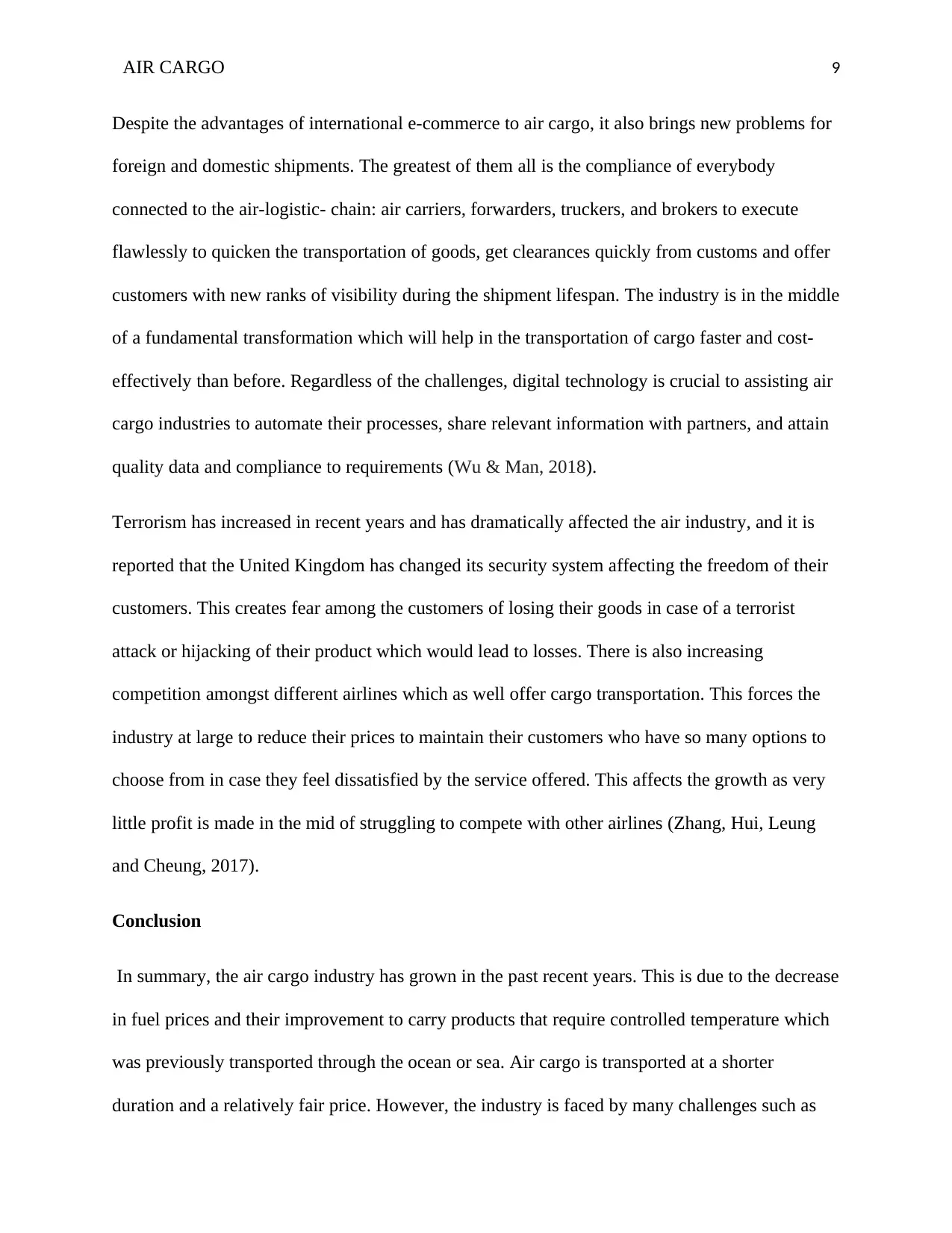
AIR CARGO 9
Despite the advantages of international e-commerce to air cargo, it also brings new problems for
foreign and domestic shipments. The greatest of them all is the compliance of everybody
connected to the air-logistic- chain: air carriers, forwarders, truckers, and brokers to execute
flawlessly to quicken the transportation of goods, get clearances quickly from customs and offer
customers with new ranks of visibility during the shipment lifespan. The industry is in the middle
of a fundamental transformation which will help in the transportation of cargo faster and cost-
effectively than before. Regardless of the challenges, digital technology is crucial to assisting air
cargo industries to automate their processes, share relevant information with partners, and attain
quality data and compliance to requirements (Wu & Man, 2018).
Terrorism has increased in recent years and has dramatically affected the air industry, and it is
reported that the United Kingdom has changed its security system affecting the freedom of their
customers. This creates fear among the customers of losing their goods in case of a terrorist
attack or hijacking of their product which would lead to losses. There is also increasing
competition amongst different airlines which as well offer cargo transportation. This forces the
industry at large to reduce their prices to maintain their customers who have so many options to
choose from in case they feel dissatisfied by the service offered. This affects the growth as very
little profit is made in the mid of struggling to compete with other airlines (Zhang, Hui, Leung
and Cheung, 2017).
Conclusion
In summary, the air cargo industry has grown in the past recent years. This is due to the decrease
in fuel prices and their improvement to carry products that require controlled temperature which
was previously transported through the ocean or sea. Air cargo is transported at a shorter
duration and a relatively fair price. However, the industry is faced by many challenges such as
Despite the advantages of international e-commerce to air cargo, it also brings new problems for
foreign and domestic shipments. The greatest of them all is the compliance of everybody
connected to the air-logistic- chain: air carriers, forwarders, truckers, and brokers to execute
flawlessly to quicken the transportation of goods, get clearances quickly from customs and offer
customers with new ranks of visibility during the shipment lifespan. The industry is in the middle
of a fundamental transformation which will help in the transportation of cargo faster and cost-
effectively than before. Regardless of the challenges, digital technology is crucial to assisting air
cargo industries to automate their processes, share relevant information with partners, and attain
quality data and compliance to requirements (Wu & Man, 2018).
Terrorism has increased in recent years and has dramatically affected the air industry, and it is
reported that the United Kingdom has changed its security system affecting the freedom of their
customers. This creates fear among the customers of losing their goods in case of a terrorist
attack or hijacking of their product which would lead to losses. There is also increasing
competition amongst different airlines which as well offer cargo transportation. This forces the
industry at large to reduce their prices to maintain their customers who have so many options to
choose from in case they feel dissatisfied by the service offered. This affects the growth as very
little profit is made in the mid of struggling to compete with other airlines (Zhang, Hui, Leung
and Cheung, 2017).
Conclusion
In summary, the air cargo industry has grown in the past recent years. This is due to the decrease
in fuel prices and their improvement to carry products that require controlled temperature which
was previously transported through the ocean or sea. Air cargo is transported at a shorter
duration and a relatively fair price. However, the industry is faced by many challenges such as
⊘ This is a preview!⊘
Do you want full access?
Subscribe today to unlock all pages.

Trusted by 1+ million students worldwide
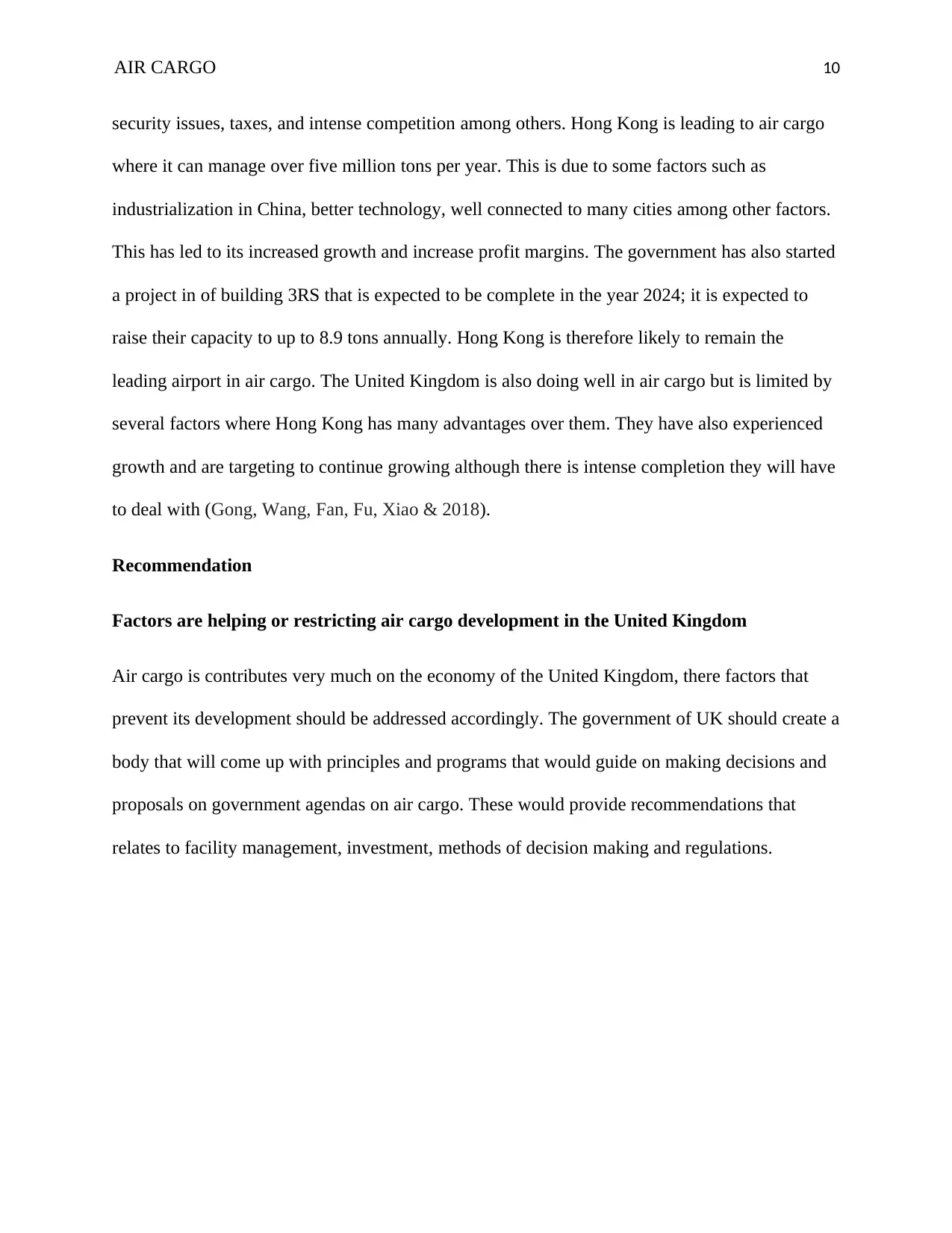
AIR CARGO 10
security issues, taxes, and intense competition among others. Hong Kong is leading to air cargo
where it can manage over five million tons per year. This is due to some factors such as
industrialization in China, better technology, well connected to many cities among other factors.
This has led to its increased growth and increase profit margins. The government has also started
a project in of building 3RS that is expected to be complete in the year 2024; it is expected to
raise their capacity to up to 8.9 tons annually. Hong Kong is therefore likely to remain the
leading airport in air cargo. The United Kingdom is also doing well in air cargo but is limited by
several factors where Hong Kong has many advantages over them. They have also experienced
growth and are targeting to continue growing although there is intense completion they will have
to deal with (Gong, Wang, Fan, Fu, Xiao & 2018).
Recommendation
Factors are helping or restricting air cargo development in the United Kingdom
Air cargo is contributes very much on the economy of the United Kingdom, there factors that
prevent its development should be addressed accordingly. The government of UK should create a
body that will come up with principles and programs that would guide on making decisions and
proposals on government agendas on air cargo. These would provide recommendations that
relates to facility management, investment, methods of decision making and regulations.
security issues, taxes, and intense competition among others. Hong Kong is leading to air cargo
where it can manage over five million tons per year. This is due to some factors such as
industrialization in China, better technology, well connected to many cities among other factors.
This has led to its increased growth and increase profit margins. The government has also started
a project in of building 3RS that is expected to be complete in the year 2024; it is expected to
raise their capacity to up to 8.9 tons annually. Hong Kong is therefore likely to remain the
leading airport in air cargo. The United Kingdom is also doing well in air cargo but is limited by
several factors where Hong Kong has many advantages over them. They have also experienced
growth and are targeting to continue growing although there is intense completion they will have
to deal with (Gong, Wang, Fan, Fu, Xiao & 2018).
Recommendation
Factors are helping or restricting air cargo development in the United Kingdom
Air cargo is contributes very much on the economy of the United Kingdom, there factors that
prevent its development should be addressed accordingly. The government of UK should create a
body that will come up with principles and programs that would guide on making decisions and
proposals on government agendas on air cargo. These would provide recommendations that
relates to facility management, investment, methods of decision making and regulations.
Paraphrase This Document
Need a fresh take? Get an instant paraphrase of this document with our AI Paraphraser
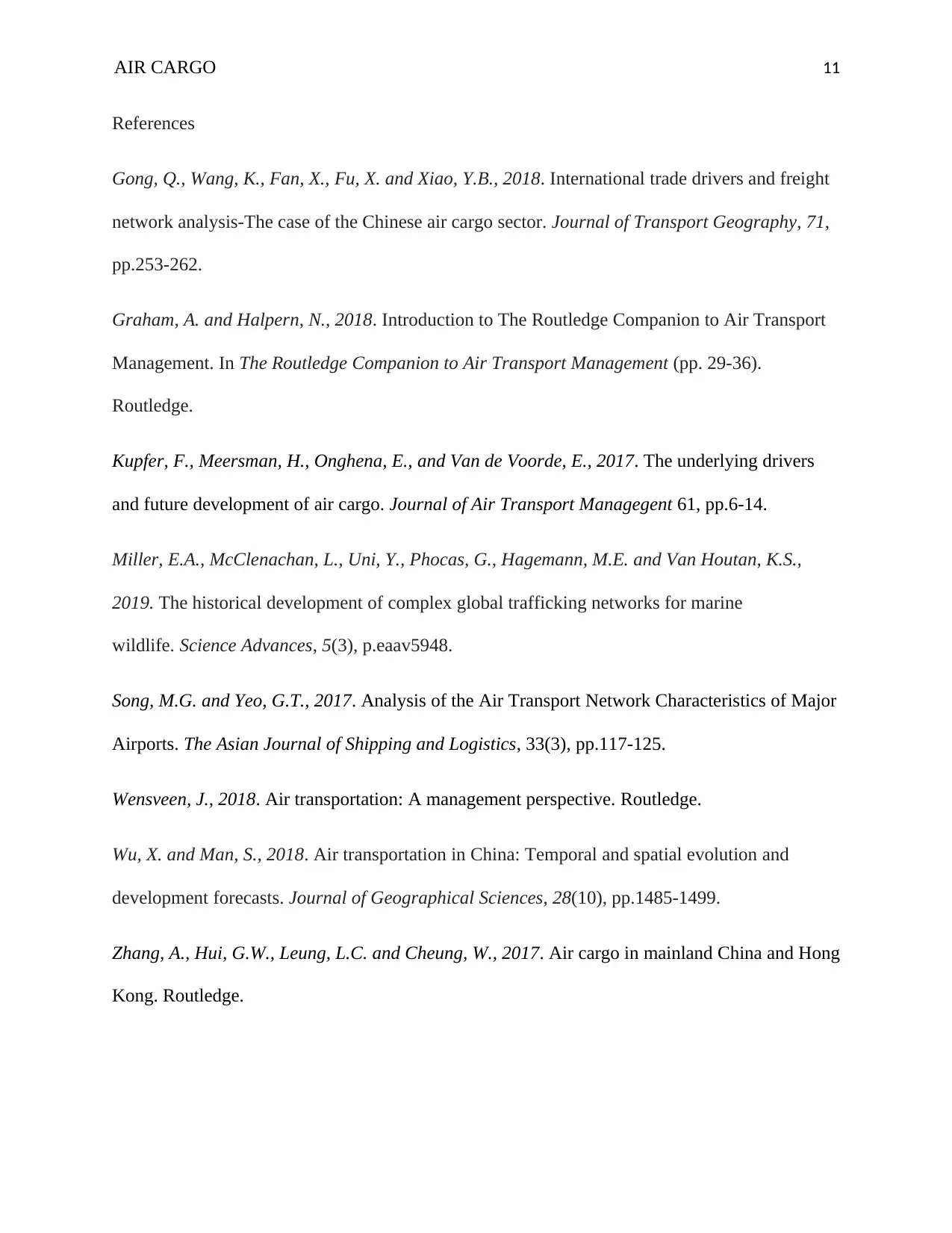
AIR CARGO 11
References
Gong, Q., Wang, K., Fan, X., Fu, X. and Xiao, Y.B., 2018. International trade drivers and freight
network analysis-The case of the Chinese air cargo sector. Journal of Transport Geography, 71,
pp.253-262.
Graham, A. and Halpern, N., 2018. Introduction to The Routledge Companion to Air Transport
Management. In The Routledge Companion to Air Transport Management (pp. 29-36).
Routledge.
Kupfer, F., Meersman, H., Onghena, E., and Van de Voorde, E., 2017. The underlying drivers
and future development of air cargo. Journal of Air Transport Managegent 61, pp.6-14.
Miller, E.A., McClenachan, L., Uni, Y., Phocas, G., Hagemann, M.E. and Van Houtan, K.S.,
2019. The historical development of complex global trafficking networks for marine
wildlife. Science Advances, 5(3), p.eaav5948.
Song, M.G. and Yeo, G.T., 2017. Analysis of the Air Transport Network Characteristics of Major
Airports. The Asian Journal of Shipping and Logistics, 33(3), pp.117-125.
Wensveen, J., 2018. Air transportation: A management perspective. Routledge.
Wu, X. and Man, S., 2018. Air transportation in China: Temporal and spatial evolution and
development forecasts. Journal of Geographical Sciences, 28(10), pp.1485-1499.
Zhang, A., Hui, G.W., Leung, L.C. and Cheung, W., 2017. Air cargo in mainland China and Hong
Kong. Routledge.
References
Gong, Q., Wang, K., Fan, X., Fu, X. and Xiao, Y.B., 2018. International trade drivers and freight
network analysis-The case of the Chinese air cargo sector. Journal of Transport Geography, 71,
pp.253-262.
Graham, A. and Halpern, N., 2018. Introduction to The Routledge Companion to Air Transport
Management. In The Routledge Companion to Air Transport Management (pp. 29-36).
Routledge.
Kupfer, F., Meersman, H., Onghena, E., and Van de Voorde, E., 2017. The underlying drivers
and future development of air cargo. Journal of Air Transport Managegent 61, pp.6-14.
Miller, E.A., McClenachan, L., Uni, Y., Phocas, G., Hagemann, M.E. and Van Houtan, K.S.,
2019. The historical development of complex global trafficking networks for marine
wildlife. Science Advances, 5(3), p.eaav5948.
Song, M.G. and Yeo, G.T., 2017. Analysis of the Air Transport Network Characteristics of Major
Airports. The Asian Journal of Shipping and Logistics, 33(3), pp.117-125.
Wensveen, J., 2018. Air transportation: A management perspective. Routledge.
Wu, X. and Man, S., 2018. Air transportation in China: Temporal and spatial evolution and
development forecasts. Journal of Geographical Sciences, 28(10), pp.1485-1499.
Zhang, A., Hui, G.W., Leung, L.C. and Cheung, W., 2017. Air cargo in mainland China and Hong
Kong. Routledge.
1 out of 11
Related Documents
Your All-in-One AI-Powered Toolkit for Academic Success.
+13062052269
info@desklib.com
Available 24*7 on WhatsApp / Email
![[object Object]](/_next/static/media/star-bottom.7253800d.svg)
Unlock your academic potential
Copyright © 2020–2026 A2Z Services. All Rights Reserved. Developed and managed by ZUCOL.





